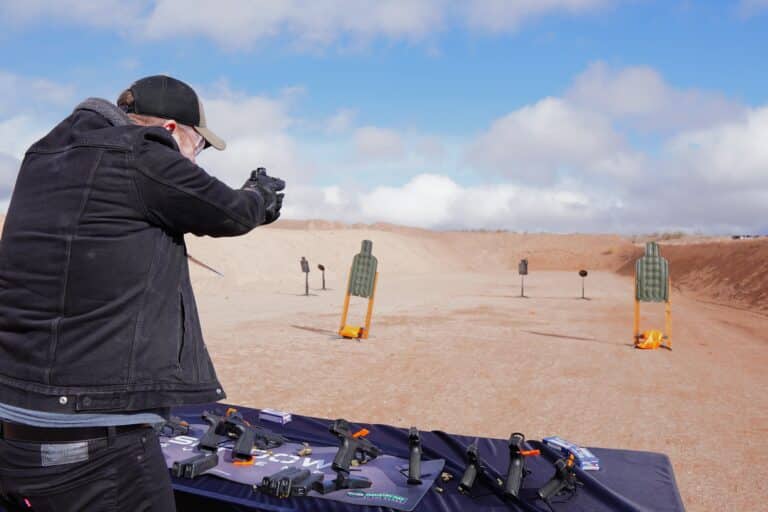As 2024 drew to a close, one of the last things Congress did was expand opportunities for Americans to practice shooting on federal lands. It did so with broad bipartisan support and without any noticeable opposition.
It was so uncontroversial that it received practically zero news coverage beyond The Reload.
Now, Congress included the range access bill as part of a larger piece of legislation featuring several uncontroversial reforms to federal land management. It also doesn’t address any of the gun-rights movement’s top priorities and just focuses on the more modest goal of range development. But the bill’s overwhelmingly bipartisan nature and breezy path through Congress provide a more concrete example of just how popular recreational shooting is in the United States than any opinion poll could show.
After all, the Explore Act actually had more Democratic co-sponsors in the House than Republican ones–though it was nearly even. It passed that body of Congress by voice vote, which means there weren’t any recorded no votes. The same was true in the Senate, where it sailed through on unanimous consent.
All of that happened at a time when polarization has reached a new zenith. At the same time Congress was narrowly avoiding a government shutdown at the last moment, and another House Speaker fight, the Explore Act made it to President Joe Biden’s desk without trouble. If anyone told you one of the last things the outgoing Congress would do in 2024 was pass a gun bill, you probably wouldn’t have believed them. But that’s what it just did.
Biden hasn’t officially announced what he’ll do with it, but all signs point to him signing it. He didn’t publicly oppose it after all. Nobody really did.
That’s pretty interesting since it will expand the number of shooting ranges on federal land. And those ranges will have to accommodate both pistol and rifle shooting. And it will all be funded by the federal government from pre-existing revenue sources.
But, as with handgun ownership writ large, this is an area where we see broad agreement in America. Recreational shooting and hunting are popular. Helping people safely practice shooting is uncontroversial.
Given that so much of the conversation around guns centers on areas of broad disagreement, it’s essential to notice the opposite. It doesn’t lead to much drama and, therefore, doesn’t draw many headlines. But there are gun proposals that remain popular enough to get through Congress without a fight or even a fuss.
That may not help gun-rights activists in their quest to make national reciprocity or silencer deregulation the law of the land. Nor will it help gun-control activists re-institute the federal “assault weapons” ban.
However, it provides a starting point for what kind of legislation might make it through the next Congress, which is shaping up to be as deeply divided on gun policy as the current one.







4 Responses
Neat, I hope this gets signed in to law. I’m concerned a lot of the language seems to be fairly soft. I wouldn’t be surprised if many (ideal) federal lands don’t get a range due to budgetary or discretionary reasons.
Yes, that’s a fair point. The language isn’t as definitive as it could be. There are a few factors that could keep a range from getting built, including competition with nearby private ranges. So, we’ll have to keep an eye on those annual reports to understand how much impact this is having.
I’m not sure how many legislators even knew this was in the bill. Here in Colorado the bill was essentially covered as a mountain bike and climbing bill, promoting long distance biking trails and allowing permanent climbing bolts in wilderness areas. I imagine there will be opposition to most near-city range sites due to the trailheads/parking areas already used by hikers and bikers. Since these are federal actions, any site will have to go through a NEPA process, and are probably ineligible for a CE (Categorical Exclusion) to performing an Environmental Assessment.
Yea, the bill certainly does more than just the range expansion. It’s possible a lot of congressmen didn’t look closely at that section, but that’s part of what makes it noteworthy. That’s because there doesn’t appear to have been a lot of activism aimed at it, which I think is the result of it being a pretty uncontroversial idea. Gun-control activists aren’t spending political capital (or real capital, for that matter) to block publicly funded shooting ranges.
You’re right that this is a relatively modest reform that may not result in ranges everywhere they’re looking at putting one. I think that’s another aspect of why it was uncontroversial. It’s not a very aggressive reform. Just an expansion of something the federal government is already doing to benefit gun owners. Realistically, that’s the kind of stuff that can pass in the current divided federal environment. A modest expansion of ranges paired with other modest reforms that hit sweet spots for different interest groups is the kind of bill that gets through without a lot of fuss.
That will probably be true in the next Congress as well. Although, we’ll have to see.